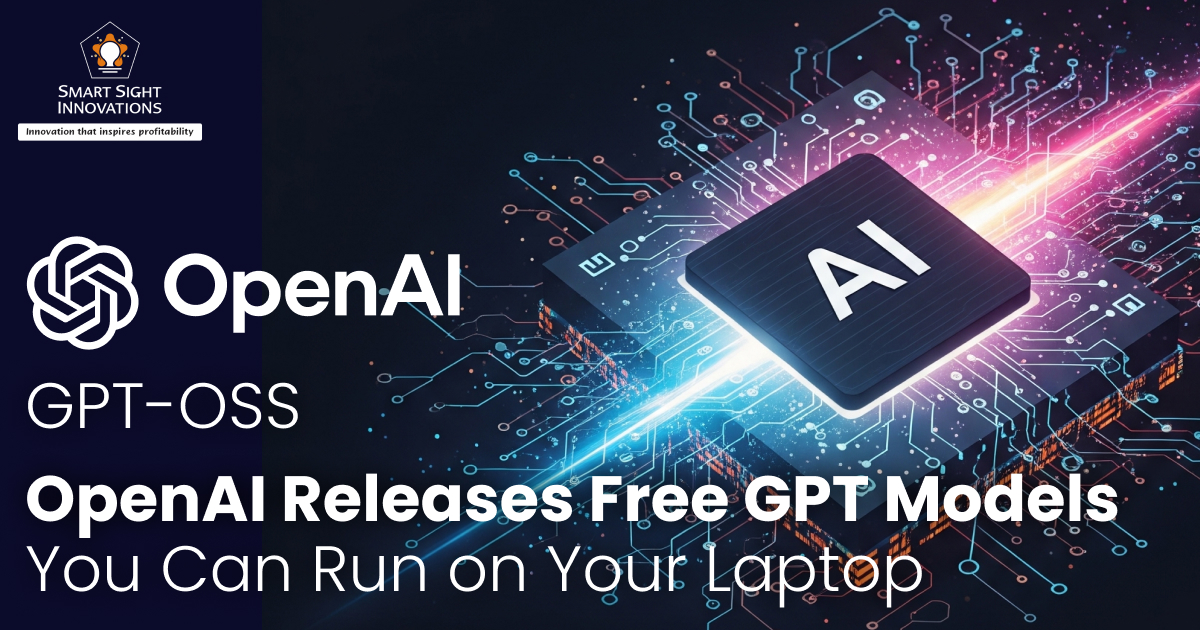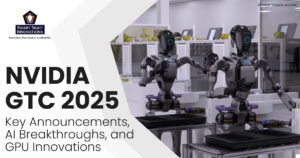
OpenAI has taken a major step toward bringing advanced AI closer to everyday devices by releasing free open-weight GPT models that can run directly on laptops. The new gpt-oss-20b and gpt-oss-120b models are designed to deliver strong reasoning, coding, and problem-solving abilities without relying solely on cloud services.
Licensed under Apache 2.0, these models are free to download, adapt, and even deploy commercially. By combining accessibility with powerful reasoning, OpenAI’s latest release signals a shift toward more open and customizable AI, one that could accelerate innovation across industries and empower individuals to experiment with cutting-edge technology right from their personal machines.
What Exactly Did OpenAI Release?

OpenAI’s gpt-oss consists of two open-weight language models:
-
gpt-oss-20b
It is optimized for local use, with reported operation on devices with 16 GB memory, making it feasible on modern laptops and desktops. Performance is described as comparable to o3-mini on common benchmarks.
-
gpt-oss-120b
It is designed to run efficiently on a single 80 GB GPU (e.g., high-end workstation or data-center card) and targeting near-parity with o4-mini on reasoning tasks.
The models are tuned for advanced reasoning, tool use, and structured outputs, making them highly versatile for real-world applications.
What Makes GPT-OSS Different from Previous OpenAI Models?

Until now, OpenAI has focused almost entirely on closed-source APIs, with models like GPT-4o or the o-series accessible only through the cloud. The release of gpt-oss-20b and gpt-oss-120b marks a dramatic change, as OpenAI is once again offering downloadable model weights, something it hasn’t done since GPT-2 in 2019.
Unlike hosted APIs, open-weight models allow developers to run locally, fine-tune, and deploy AI on their own infrastructure. This level of control means lower latency, better data privacy, and reduced dependence on external servers, making gpt-oss a milestone in OpenAI’s evolving approach to openness and accessibility.
Performance Benchmarks and Comparisons

OpenAI positions the gpt-oss models as competitive with its proprietary lineup. The smaller gpt-oss-20b achieves parity with o3-mini across reasoning and coding benchmarks, while the larger gpt-oss-120b performs near the level of o4-mini. This makes them strong contenders in the reasoning space, even compared to rival open models like Meta’s LLaMA 3.
While these models focus on scale and general-purpose use, OpenAI has emphasized reasoning efficiency and tool use in gpt-oss. For developers and researchers, this means gpt-oss is not just a technical experiment, but a model suite capable of handling real workloads in reasoning-heavy domains.
Licensing and Commercial Use

The release under the Apache 2.0 license is a major enabler for businesses and independent developers. Unlike restrictive or copyleft licenses, Apache 2.0 is permissive, business-friendly, and easy to adopt commercially. Companies can integrate gpt-oss into products and services without legal complications or obligations to share modifications.
Startups can fine-tune the models for niche applications, while enterprises can adapt them for proprietary solutions. OpenAI highlights this licensing choice on its product page, positioning gpt-oss as models that can truly “run anywhere,” from laptops to enterprise deployments, without the friction that typically accompanies AI licensing.
Running GPT-OSS on Laptops

One of the most exciting aspects of the release is that gpt-oss-20b is optimized to run directly on laptops and desktops with around 16 GB of memory. This makes it accessible to developers, researchers, and even hobbyists who want to experiment with advanced AI locally. OpenAI has ensured gpt-oss launches with a wide ecosystem of integrations, making adoption seamless.
This broad compatibility reflects a deliberate strategy, where OpenAI wants these models to be truly flexible, whether running on a laptop, workstation, or enterprise cloud environment. Both the models are freely available on Hugging Face and come pre-optimized for smooth performance.
To simplify adoption, OpenAI has provided tools in Python and Rust, plus support for platforms like Azure, Hugging Face, Ollama, LM Studio, and Windows via ONNX Runtime. This means anyone, from hobbyists to researchers, can quickly experiment, customize, and run powerful AI locally.
Safety and Red-Teaming Measures

Despite being open-weight, OpenAI emphasizes that gpt-oss underwent rigorous safety testing. The models were evaluated under the company’s Preparedness Framework, including adversarial fine-tuning to limit harmful behavior. OpenAI states that neither model reached “high capability” levels of risk, even under stress tests for misuse.
To reinforce transparency, OpenAI has also launched a public red-teaming challenge, encouraging the community to find weaknesses and report them. This balance between openness and responsibility underscores OpenAI’s commitment to ensuring that local, customizable AI remains safe and trustworthy as adoption grows.
Use Cases and Applications

The ability to run GPT models locally unlocks a wide spectrum of use cases. Organizations with data privacy concerns can deploy gpt-oss on internal servers, ensuring sensitive information never leaves their control. Developers can fine-tune the models on domain-specific data to create custom assistants for legal research, healthcare, or enterprise support. Educators and students can access powerful reasoning engines for learning and research, even offline.
Why This Release Matters for the Future of AI

OpenAI’s decision to release gpt-oss is more than a product update, it’s a statement about the future of AI accessibility. By making powerful reasoning models available as open weights, OpenAI acknowledges the growing demand for local, private, and customizable AI systems. This move positions the company alongside competitors like Meta and Mistral, while also empowering developers and researchers with new freedom to innovate.
For the broader ecosystem, gpt-oss signals a shift toward decentralized AI, where models are not confined to proprietary platforms but can run anywhere. In many ways, this release may accelerate the next wave of AI adoption, putting advanced reasoning capabilities directly into the hands of users.
The launch of Open Models gpt-oss-20b and gpt-oss-120b represents a major step for open-weight AI. These models enhance reasoning and safety while giving developers greater flexibility than hosted-only options. By lowering barriers for emerging markets, smaller organizations, and resource-constrained sectors, they make advanced AI tools accessible to more people.
This accessibility fosters innovation, supports transparent research, and empowers communities to build solutions tailored to their needs. A thriving open model ecosystem ensures AI remains democratic and broadly beneficial, and OpenAI encourages developers worldwide to experiment, collaborate, and push the boundaries of what these models can achieve.














